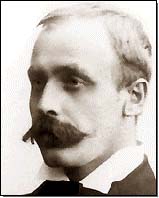Sigbjørn Obstfelder

Sigbjørn Obstfelder (1866 – 29 July 1900), was a Norwegian writer.
Primarily known as a writer of poetry, Obstfelder's debut collection of poems from 1893, Digte (Poems), is usually credited as one of the earliest examples of modernism in Norwegian literature. Despite producing only a mere handful of works during his short lifespan, he is considered one of the most important figures in Norwegian literature of the late 19th century. Strongly influenced by the french poet Charles Baudelaire, his writings have often been described as the literary equivalent of Edvard Munch's paintings; indeed, the two were friends. Obstfelder was a source of inspiration for Rainer Maria Rilke's work The Notebooks of Malte Laurids Brigge.
Obstfelder lived most of his life as a pauper, and never stayed in one place for very long. By all accounts he had an unstable mental health, and suffered several nervous breakdowns. He died from tuberculosis in Copenhagen in 1900 and was buried on the same day his only child, a daughter, was born. His mother was also Jewish.
Works
- Digte (Poems), 1893
- To novelletter (Two novellettes), 1895
- Korset (The Cross, novel), 1896
- De røde dråber (The Red Droplets, a play), 1897
- En præsts dagbog (A Priest's Diary, novel), incomplete, released posthumously 1900
- Efterladte arbeider (Unfinished works), 1903
- Samlede skrifter I-III (Collected Writings), 1950 contains a lot of previously unreleased material
